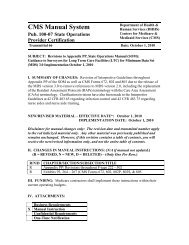LOUISIANA Community Mental Health Services Block Grant ...
LOUISIANA Community Mental Health Services Block Grant ...
LOUISIANA Community Mental Health Services Block Grant ...
You also want an ePaper? Increase the reach of your titles
YUMPU automatically turns print PDFs into web optimized ePapers that Google loves.
itself is an evidence-based model based on national evaluations funded to evaluate all federally<br />
funded systems of care.<br />
Due to Louisiana‟s monumental need for systems reform, the Office of Juvenile Justice (OJJ),<br />
formerly the Office of Youth Development (OYD) began implementation of a plan to address<br />
juvenile justice reform and adopt models of change, as well as evidence based interventions. Multisystemic<br />
Therapy (MST) is one such evidence based therapy that is provided by LA-YES partners,<br />
and specifically recommended by OJS. This evidence-based practice, now adopted by the Louisiana<br />
Office of Behavioral <strong>Health</strong> and the state‟s Medicaid Office, was designed to work with youngsters<br />
to alter the trajectory away from incarceration toward adaptive functioning in society. MST is a<br />
choice intervention because youth with behavioral and emotional disorders and juvenile justice<br />
involvement account for a significant percentage of the LA-YES referral base. Other evidence based<br />
interventions delivered by the LA-YES Provider Network include cognitive behavior therapy, and<br />
trauma focused cognitive behavior therapy.<br />
Interagency collaboration through the Interagency Service Coordination (ISC) Program is defined as<br />
“formal arrangements” between child serving agencies. Ten Local Governing Entities<br />
(Regions/Districts) Interagency Service Coordination teams are currently operating in Louisiana.<br />
These teams include permanent members who make recommendations that may resolve problems<br />
with service delivery for children who have unique needs that are difficult to meet. Team members<br />
include mental health, education, developmental disabilities, child welfare, public health, and<br />
juvenile justice. Other members of a team include the parent/caretaker, child/youth whenever<br />
appropriate, and other key person‟s involved in the child and family‟s life and services. The local<br />
teams may request assistance from the State Interagency Team for individuals who require resources<br />
unavailable to the local ISCs. Many of the families served reside in rural areas with few mental health<br />
and other resources, and the agencies coordinate to improve access to quality care in many ways<br />
including video conferencing, coordinated services, and educating families where and how to get<br />
care.<br />
There is an increase in youth with multiple needs who are developmentally delayed, mentally ill,<br />
chemically addicted and who are living in poverty. More juvenile judges are ordering local ISC<br />
teams to meet and collaborate with other agencies to create appropriate placements where there are<br />
none. Approximately 95% of the ISC service plans successfully provide a stable placement and<br />
wraparound services to maintain the individual in the community. Those plans that failed required<br />
additional local ISC and State ISC meetings to locate and create appropriate resources to meet the<br />
needs of these youth.<br />
The Families In Need of <strong>Services</strong> (FINS) became effective in all courts having juvenile jurisdiction<br />
on July 1, 1994, as Title VII of the Louisiana Children's Code. FINS is an approach designed to<br />
bring together coordinated community resources for the purpose of helping families (troubled youth<br />
and their parents) to remedy self destructive behaviors by juveniles and/or other family members.<br />
The goals of FINS are to reduce formal juvenile court involvement while generating appropriate<br />
community services to benefit the child and improve family relations. The child and family are not<br />
adjudicated unless there is failure by family members to cooperate with the mandates of the service<br />
plan. FINS has been successful in the following ways: 1) facilitating the receipt of needed services,<br />
2) coordinating the cooperation of the community and its resources, and 3) decreasing involvement in<br />
the Judicial System.<br />
PART C <strong>LOUISIANA</strong> FY 2011 PAGE 82<br />
SECTION II: ADULT & CHILD/ YOUTH<br />
IDENTIFICATION & ANALYSIS OF SERVICE SYSTEM’S STRENGTHS, NEEDS, & PRIORITIES<br />
UNMET SERVICE NEEDS & PLANS TO ADDRESS UNMET NEEDS
















